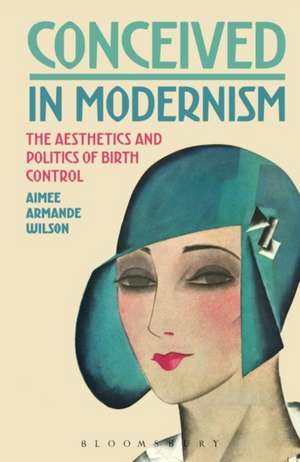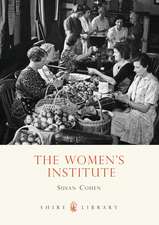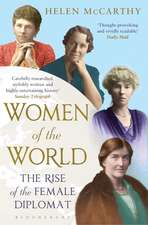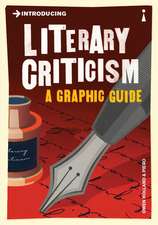Conceived in Modernism: The Aesthetics and Politics of Birth Control
Autor Dr. Aimee Armande Wilsonen Limba Engleză Paperback – 28 iun 2017
| Toate formatele și edițiile | Preț | Express |
|---|---|---|
| Paperback (1) | 254.37 lei 6-8 săpt. | +88.45 lei 7-11 zile |
| Bloomsbury Publishing – 28 iun 2017 | 254.37 lei 6-8 săpt. | +88.45 lei 7-11 zile |
| Hardback (1) | 653.77 lei 6-8 săpt. | |
| Bloomsbury Publishing – 16 dec 2015 | 653.77 lei 6-8 săpt. |
Preț: 254.37 lei
Preț vechi: 329.55 lei
-23% Nou
Puncte Express: 382
Preț estimativ în valută:
48.68€ • 50.99$ • 40.34£
48.68€ • 50.99$ • 40.34£
Carte tipărită la comandă
Livrare economică 08-22 aprilie
Livrare express 04-08 martie pentru 98.44 lei
Preluare comenzi: 021 569.72.76
Specificații
ISBN-13: 9781501333958
ISBN-10: 150133395X
Pagini: 176
Ilustrații: 1 b/w illustration
Dimensiuni: 268 x 142 x 16 mm
Greutate: 0.21 kg
Ediția:NIPPOD
Editura: Bloomsbury Publishing
Colecția Bloomsbury Academic
Locul publicării:New York, United States
ISBN-10: 150133395X
Pagini: 176
Ilustrații: 1 b/w illustration
Dimensiuni: 268 x 142 x 16 mm
Greutate: 0.21 kg
Ediția:NIPPOD
Editura: Bloomsbury Publishing
Colecția Bloomsbury Academic
Locul publicării:New York, United States
Caracteristici
Forces us to reconsider the genesis of Anglo-American modernism since, as this book demonstrates, access to birth control is sometimes a necessary precursor to a modernist aesthetic
Notă biografică
Aimee Armande Wilson is Assistant Professor of Humanities at University of Kansas, USA, where she specializes in 20th-century literature and feminist theory.
Cuprins
IntroductionChapter 1: Modernism, Monsters, and Margaret SangerChapter 2: "God spoke with me to-day": Prophecy, Birth Control, and The Waste Land Chapter 3: "Sentences swelled, adjectives multiplied": Reproduction and the Modernist Aesthetic Chapter 4: Southern Mother, Lethal Fetus; Or How Birth Control Makes a Modernist Out of Flannery O'Connor Chapter 5: Where Alien Abduction Meets Family Planning: Personhood, Race and Reproduction in Octavia Butler's DawnCodaBibliographyIndex
Recenzii
Fiction is a rich ground for considering the questions of birth control and abortion ... [Wilson] make[s] intriguing connections across countries and periods.
[D]ensely packed with meticulous academic argument . The book expanded my idea of modernism to include that earlier literature and its very different concerns . That Wilson resurrects these stories is significant. And where scholars have previously seen the birth-control movement as arising in parallel with modernism, Wilson has found revealing intersections.
Wilson perceptively connects literary form and political discourse, birth control's rhetorical past with debates in contemporary reproductive rights, making provocative connections between the advent of the contraceptive era and the stylistic revolutions of literary modernism that transform the reader's understanding of both movements. Spanning twentieth century authors from T.S. Eliot to Octavia Butler, Wilson's astute analysis highlights the inescapable interplay between political discourse and literary form, solidifying the place of the birth control movement as a transformative moment in western culture and her own role as a significant new voice in modernist literary criticism.
Conceived in Modernism sheds new light on the relation between Anglo-American modernist aesthetics and the early birth control movement. It intervenes forcefully in debates about modernist sexualities and the history of birth control and reproduction. Aimee Armande Wilson's politically informed and theoretically sophisticated readings of a range of canonical and lesser-known literary authors and birth control activists are illuminating and inspiring. Interdisciplinary in scope, the book makes an important and timely contribution to the intersecting inquiries of modernist studies, the history of sexuality, feminist criticism and sexuality studies.
[D]ensely packed with meticulous academic argument . The book expanded my idea of modernism to include that earlier literature and its very different concerns . That Wilson resurrects these stories is significant. And where scholars have previously seen the birth-control movement as arising in parallel with modernism, Wilson has found revealing intersections.
Wilson perceptively connects literary form and political discourse, birth control's rhetorical past with debates in contemporary reproductive rights, making provocative connections between the advent of the contraceptive era and the stylistic revolutions of literary modernism that transform the reader's understanding of both movements. Spanning twentieth century authors from T.S. Eliot to Octavia Butler, Wilson's astute analysis highlights the inescapable interplay between political discourse and literary form, solidifying the place of the birth control movement as a transformative moment in western culture and her own role as a significant new voice in modernist literary criticism.
Conceived in Modernism sheds new light on the relation between Anglo-American modernist aesthetics and the early birth control movement. It intervenes forcefully in debates about modernist sexualities and the history of birth control and reproduction. Aimee Armande Wilson's politically informed and theoretically sophisticated readings of a range of canonical and lesser-known literary authors and birth control activists are illuminating and inspiring. Interdisciplinary in scope, the book makes an important and timely contribution to the intersecting inquiries of modernist studies, the history of sexuality, feminist criticism and sexuality studies.
















